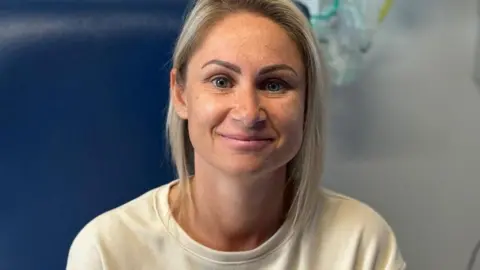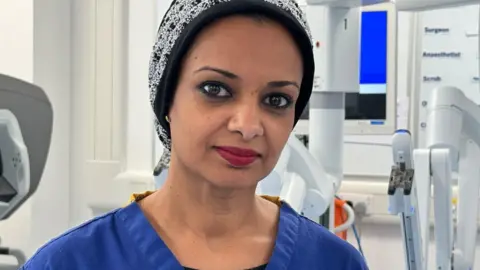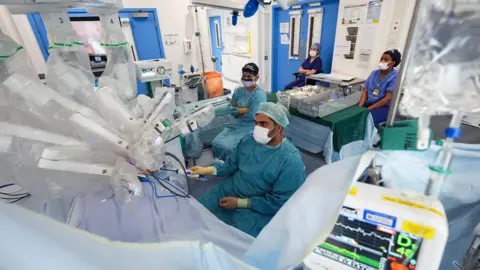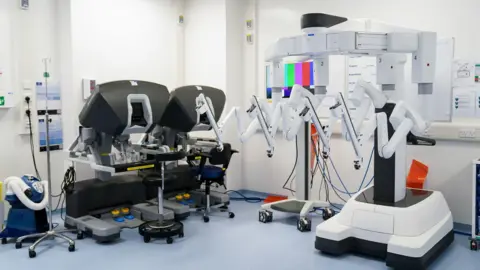Woman's cancer operation filmed in awareness drive
 BBC
BBCA woman has allowed cameras to film her bowel cancer operation as she tries to raise awareness of the benefits of detecting the disease early.
Kelly Buckle, 40, from Great Barr, Sandwell, had state-of-the-art robotic surgery on Wednesday at Solihull Hospital's new £50m surgical hub.
The mum-of-two was diagnosed with the disease in February after she had rectal bleeding while on holiday in Madeira.
Mrs Buckle spoke out as the government backed a trial to detect bowel cancer through a blood test, to speed up diagnosis and reduce patients having invasive tests such as colonoscopies.
Speaking to the BBC ahead of her procedure, Mrs Buckle, an advanced nurse practitioner at a GP surgery, said she felt "apprehensive" but "relieved".
"They're going to take the tumour away via robotic surgery," she said.
"Then I will have a stoma fixed - may be temporary, may be permanent, depending on the outcome of the surgery but they will be removing the tumour today for me and then I may have to have some treatment after then as well."

Mrs Buckle said she was keen to speak out to raise awareness of the importance of early diagnosis.
"Kelly, as long as I've known her for the last 20 years, is the most sort of caring and selfless person that you could wish to meet," added her husband, David Buckle.
 Jacob King/PA Wire
Jacob King/PA WireThe hospital's surgical hub opened in November with 250 new members of staff and can carry out 6,000 operations each year.
Surgeon Nuha Yassin said the robotic surgery needed "precision" and it led to a better recovery for patients.
"When we use robotic equipment compared to standard keyhole equipment, we have less damage to the tissues so then that means the gut can return to function earlier as well," she said.
"So this is ideal for Kelly."
Bowel cancer is the fourth most common cancer in the UK with about 44,100 people diagnosed every year, according to Cancer Research UK.
 Jacob King/PA Wire
Jacob King/PA WireMrs Buckle's surgery came on the day the government backed a trial for a blood test which can detect 12 cancers, including bowel cancer, at an earlier stage.
A spokesperson said the technology had the potential to improve rates of diagnosis leading to faster, more effective treatment.
Mark Dilworth, surgical hub medical director at Solihull Hospital, described the blood test as "much more straightforward" and a "game-changer".
"A colonoscopy is not something that many patients will enjoy going through and we can't do a lot to minimise that unfortunately," he said.
Follow BBC Birmingham on BBC Sounds, Facebook, X and Instagram.
